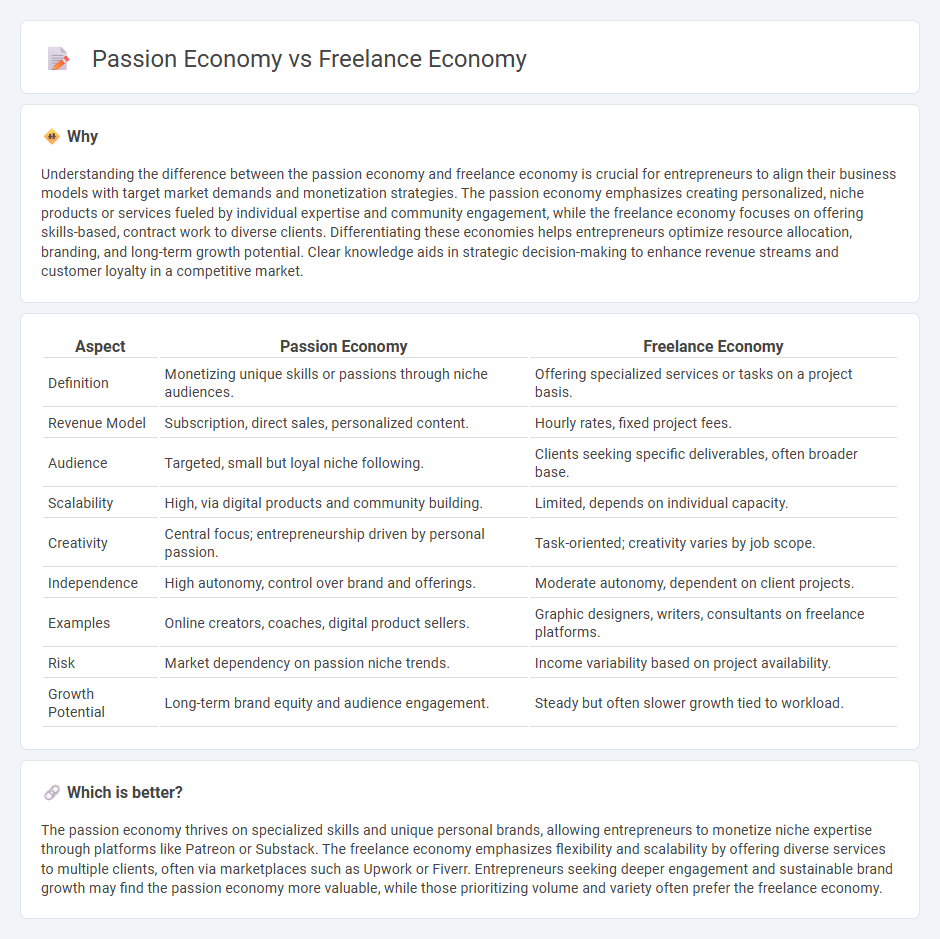
The passion economy centers on individuals monetizing unique skills and personal brands, often creating high-value, niche content or services. The freelance economy emphasizes flexible, contract-based work across various industries, prioritizing versatility and volume of clients. Explore the distinctions and opportunities within these evolving economic models.
Why it is important
Understanding the difference between the passion economy and freelance economy is crucial for entrepreneurs to align their business models with target market demands and monetization strategies. The passion economy emphasizes creating personalized, niche products or services fueled by individual expertise and community engagement, while the freelance economy focuses on offering skills-based, contract work to diverse clients. Differentiating these economies helps entrepreneurs optimize resource allocation, branding, and long-term growth potential. Clear knowledge aids in strategic decision-making to enhance revenue streams and customer loyalty in a competitive market.
Comparison Table
| Aspect | Passion Economy | Freelance Economy |
|---|---|---|
| Definition | Monetizing unique skills or passions through niche audiences. | Offering specialized services or tasks on a project basis. |
| Revenue Model | Subscription, direct sales, personalized content. | Hourly rates, fixed project fees. |
| Audience | Targeted, small but loyal niche following. | Clients seeking specific deliverables, often broader base. |
| Scalability | High, via digital products and community building. | Limited, depends on individual capacity. |
| Creativity | Central focus; entrepreneurship driven by personal passion. | Task-oriented; creativity varies by job scope. |
| Independence | High autonomy, control over brand and offerings. | Moderate autonomy, dependent on client projects. |
| Examples | Online creators, coaches, digital product sellers. | Graphic designers, writers, consultants on freelance platforms. |
| Risk | Market dependency on passion niche trends. | Income variability based on project availability. |
| Growth Potential | Long-term brand equity and audience engagement. | Steady but often slower growth tied to workload. |
Which is better?
The passion economy thrives on specialized skills and unique personal brands, allowing entrepreneurs to monetize niche expertise through platforms like Patreon or Substack. The freelance economy emphasizes flexibility and scalability by offering diverse services to multiple clients, often via marketplaces such as Upwork or Fiverr. Entrepreneurs seeking deeper engagement and sustainable brand growth may find the passion economy more valuable, while those prioritizing volume and variety often prefer the freelance economy.
Connection
The passion economy empowers entrepreneurs to monetize unique skills and personal interests, transforming passion into viable income streams. Freelance economy platforms facilitate this by providing flexible marketplaces where individuals can offer specialized services directly to clients worldwide. Together, they drive a dynamic ecosystem fostering innovation, personalized work, and economic independence.
Key Terms
Autonomy
The freelance economy emphasizes flexible work arrangements and multiple income streams, granting individuals autonomy over projects and schedules. In contrast, the passion economy centers on deep personal expertise and unique skills, allowing creators full control over their brand and audience relationships. Explore how autonomy shapes careers differently in these evolving economic models.
Monetization
The freelance economy centers on offering specialized skills and services to clients for project-based payments, often relying on platforms like Upwork and Fiverr for monetization. In contrast, the passion economy enables creators to build direct relationships with niche audiences, monetizing through subscriptions, merchandise, and personalized content on platforms such as Patreon and Substack. Explore how these economies reshape income streams and empower creators by diving deeper into their monetization strategies.
Niche specialization
The freelance economy relies on diverse skill sets to fulfill a broad range of client needs, often competing on pricing and availability. In contrast, the passion economy emphasizes deep niche specialization, where individuals monetize unique skills and personal brands, creating high-value engagements with targeted audiences. Discover how niche specialization in the passion economy can elevate your career by exploring its distinct advantages.
Source and External Links
Upwork Study Finds 64 Million Americans Freelanced in 2023 - In 2023, 64 million Americans freelanced, representing 38% of the U.S. workforce and contributing $1.27 trillion to the economy, with freelancers increasingly using generative AI tools and providing skilled services.
Portal Aggregate of Freelance Economy Statistics - Human Cloud - The global freelance economy is a $5.4 trillion market, with many freelancers earning more than average workers and skilled freelancing growing, while concerns about financial performance and platform loyalty remain prevalent.
What is the gig economy and what's the deal for gig workers? - The gig economy, fueled by digital platforms connecting freelancers and customers, is expanding rapidly with a $556.7 billion market size in 2024, expected to triple by 2032, emphasizing flexible, short-term work arrangements and raising questions about worker protections.
 dowidth.com
dowidth.com